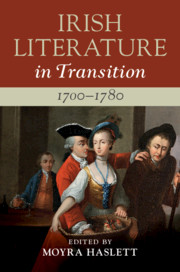Book contents
- Irish Literature in Transition, 1700–1780
- Irish Literature in Transition
- Irish Literature in Transition, 1700–1780
- Copyright page
- Contents
- Illustrations
- Contributors
- Series Preface
- General Acknowledgements
- Introduction
- Part I Starting Points
- Part II Philosophical and Political Frameworks
- Part III Local, National, and Transnational Contexts
- Part IV Gender and Sexuality
- Part V Transcultural Contexts
- Chapter 15 The Popular Criminal Narrative and the Development of the Irish Novel
- Chapter 16 Gaelic Influences and Echoes in the Irish Novel, 1700–1780
- Chapter 17 New Beginning or Bearer of Tradition? Early Irish Fiction and the Construction of the Child
- Part VI Retrospective Readings
- Index
Chapter 17 - New Beginning or Bearer of Tradition? Early Irish Fiction and the Construction of the Child
from Part V - Transcultural Contexts
Published online by Cambridge University Press: 28 February 2020
- Irish Literature in Transition, 1700–1780
- Irish Literature in Transition
- Irish Literature in Transition, 1700–1780
- Copyright page
- Contents
- Illustrations
- Contributors
- Series Preface
- General Acknowledgements
- Introduction
- Part I Starting Points
- Part II Philosophical and Political Frameworks
- Part III Local, National, and Transnational Contexts
- Part IV Gender and Sexuality
- Part V Transcultural Contexts
- Chapter 15 The Popular Criminal Narrative and the Development of the Irish Novel
- Chapter 16 Gaelic Influences and Echoes in the Irish Novel, 1700–1780
- Chapter 17 New Beginning or Bearer of Tradition? Early Irish Fiction and the Construction of the Child
- Part VI Retrospective Readings
- Index
Summary
This chapter examines the relationship between constructions of childhood and the development of narrative fiction in Ireland in the period after the Williamite settlement. By highlighting the figure of the child as a central preoccupation of this period, I propose a fresh consideration of religious controversy, the response to Enlightenment ideas, and the development of narrative fiction in Ireland in this period. The desire to create a new and improved Ireland was at one and the same time an aspect of English colonial ideology with a long and sometimes violent history, but also an optimistic and progressive vision which drew on the radical philosophies of Locke and others. Literacy and print culture were increasingly seen as pivotal to the spread of enlightenment and the improvement of both the individual and society, but anxiety as to the loyalty of Catholics also generated ambivalence about the benefits of widespread literacy. In this essay I will argue that a significant strand of early Irish fiction emerges from a distinctive preoccupation with questions of individual and societal formation and reformation, and that there are close links between early Irish fictions and discourses of religious reform, pedagogy, and social and economic improvement.
Keywords
- Type
- Chapter
- Information
- Irish Literature in Transition, 1700–1780 , pp. 343 - 362Publisher: Cambridge University PressPrint publication year: 2020
- 1
- Cited by



